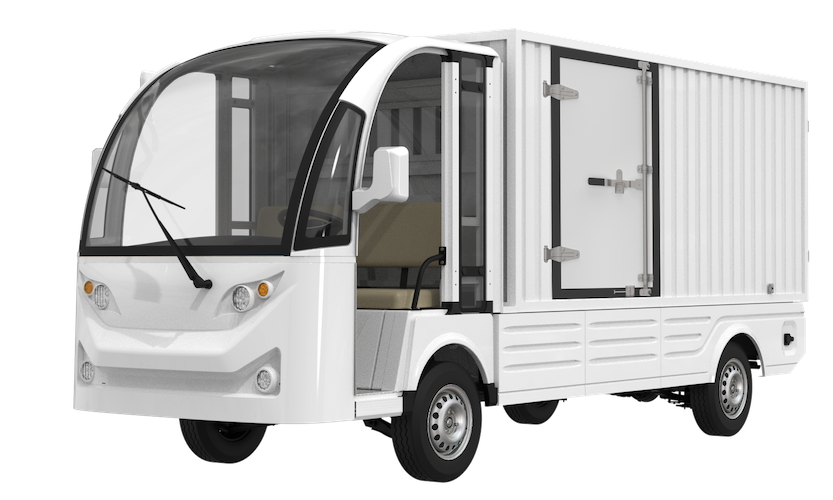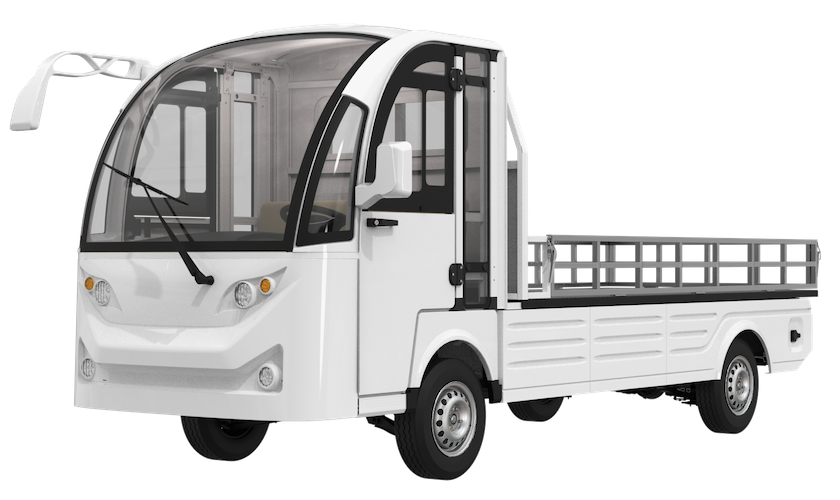Content Menu
● Understanding Customized Electric Trucks
>> The Rise of Electric Trucks
● Benefits of Customized Electric Trucks
>> Enhanced Efficiency
>> Cost Savings
>> Environmental Impact
>> Improved Brand Image
● Challenges of Customized Electric Trucks
>> High Initial Costs
>> Limited Range
>> Charging Infrastructure
>> Technological Integration
● The Future of Customized Electric Trucks
>> Innovations on the Horizon
>> Expanding Market Opportunities
>> Policy and Regulation Support
● Frequently Asked and Questions regarding Customized Electric Truck
>> 1. What are the latest advancements in battery technology for electric trucks?
>> 2. How can businesses finance the high initial costs of customized electric trucks?
>> 3. What are the best practices for integrating and maintaining advanced technologies in electric trucks?
>> 4. How do customized electric trucks impact operational efficiency?
>> 5. What role do government policies play in the adoption of electric trucks?
The automotive industry is undergoing a significant transformation, with electric vehicles (EVs) leading the charge towards a more sustainable future. Among these innovations, customized electric trucks are gaining traction, offering unique solutions tailored to specific business needs. This article explores the benefits and challenges of customized electric trucks, delving into their design, functionality, and impact on various industries.

Understanding Customized Electric Trucks
Customized electric trucks are vehicles designed to meet the specific requirements of businesses and industries. Unlike standard electric trucks, which come with fixed specifications, customized versions allow for modifications in size, capacity, and features. This customization can include alterations to the truck's body, battery capacity, and even the integration of specialized equipment for particular tasks. For instance, a food delivery service might require a refrigerated truck, while a construction company may need a vehicle equipped with cranes or other heavy machinery. This level of customization ensures that businesses can maximize their operational efficiency and effectiveness, ultimately leading to better service delivery and customer satisfaction.
The Rise of Electric Trucks
The shift towards electric trucks is driven by several factors, including environmental concerns, rising fuel costs, and advancements in battery technology. As more companies seek to reduce their carbon footprint, electric trucks present a viable alternative to traditional diesel-powered vehicles. The customization aspect further enhances their appeal, allowing businesses to optimize their operations while adhering to sustainability goals. Additionally, as governments worldwide implement stricter emissions regulations, the transition to electric trucks becomes not just a choice but a necessity for many companies. This growing trend is supported by increasing consumer demand for environmentally friendly products and services, pushing businesses to adopt electric solutions.
Benefits of Customized Electric Trucks
Enhanced Efficiency
One of the primary advantages of customized electric trucks is their ability to enhance operational efficiency. Businesses can tailor the truck's specifications to match their specific needs, ensuring that the vehicle performs optimally for its intended purpose. For instance, a delivery service may require a truck with a larger cargo space, while a construction company might need a vehicle equipped with specialized tools. This tailored approach not only improves productivity but also reduces downtime, as vehicles are better suited to handle the tasks at hand. Furthermore, customized electric trucks can be designed to optimize energy consumption, allowing businesses to operate more sustainably while also saving on operational costs.
Cost Savings
While the initial investment in electric trucks can be higher than that of conventional vehicles, the long-term cost savings are significant. Electric trucks typically have lower operating costs due to reduced fuel expenses and lower maintenance requirements. Customized electric trucks can further amplify these savings by optimizing energy consumption based on the specific demands of the business. For example, a truck designed for short urban deliveries may have a smaller battery, reducing costs while still meeting the range requirements. Additionally, businesses can benefit from government incentives and tax breaks for adopting electric vehicles, further offsetting the initial investment. Over time, these savings can contribute to a healthier bottom line, allowing companies to reinvest in their operations or expand their fleets.
Environmental Impact
Customized electric trucks contribute to a reduction in greenhouse gas emissions, aligning with global efforts to combat climate change. By replacing diesel trucks with electric alternatives, businesses can significantly lower their carbon footprint. Furthermore, the customization process can include features that enhance energy efficiency, such as regenerative braking systems and lightweight materials. These innovations not only reduce emissions but also promote a more sustainable approach to logistics and transportation. As consumers become increasingly aware of environmental issues, companies that adopt electric trucks can enhance their reputation and appeal to eco-conscious customers. This shift towards sustainability is not just beneficial for the planet; it also positions businesses as leaders in their industries, attracting customers who prioritize environmental responsibility.
Improved Brand Image
In today's market, consumers are increasingly conscious of the environmental impact of their purchases. Companies that adopt customized electric trucks can enhance their brand image by showcasing their commitment to sustainability. This positive perception can lead to increased customer loyalty and a competitive edge in the marketplace. By promoting their use of electric trucks in marketing campaigns, businesses can differentiate themselves from competitors who may still rely on traditional fossil fuel vehicles. Additionally, as more consumers seek to support environmentally friendly companies, the adoption of electric trucks can lead to increased sales and market share. This alignment with consumer values not only strengthens brand loyalty but also fosters a positive corporate culture focused on sustainability and innovation.

Challenges of Customized Electric Trucks
High Initial Costs
Despite the long-term savings, the upfront costs associated with customized electric trucks can be a barrier for many businesses. The customization process often requires significant investment in design and manufacturing, which can deter companies from making the switch to electric. However, as technology advances and production scales up, these costs are expected to decrease. Moreover, businesses can explore financing options, such as leasing or partnerships with manufacturers, to mitigate the financial burden. By carefully analyzing the total cost of ownership, companies can make informed decisions about investing in customized electric trucks, weighing the initial costs against the potential long-term savings and benefits.
Limited Range
One of the most significant challenges facing electric trucks is their limited range compared to traditional diesel vehicles. While advancements in battery technology are improving this aspect, customized electric trucks may still face range limitations based on their specific configurations. Businesses must carefully consider their operational needs and the distances they need to cover when selecting a customized electric truck. To address this challenge, companies can implement route optimization strategies, ensuring that electric trucks are used in scenarios where their range is sufficient. Additionally, investing in fast-charging infrastructure can help alleviate range anxiety, allowing drivers to recharge quickly during breaks and extend their operational capabilities.
Charging Infrastructure
The availability of charging infrastructure is another critical factor in the adoption of customized electric trucks. Businesses operating in areas with limited charging stations may find it challenging to integrate electric trucks into their fleets. To address this issue, companies may need to invest in their own charging solutions or collaborate with local governments to expand charging networks. Furthermore, businesses can explore partnerships with charging network providers to ensure access to a reliable and extensive charging infrastructure. By proactively addressing charging needs, companies can facilitate a smoother transition to electric trucks and enhance their operational efficiency.
Technological Integration
Customizing electric trucks often involves integrating advanced technologies, such as telematics and autonomous driving features. While these technologies can enhance the functionality of the trucks, they also introduce complexities in terms of implementation and maintenance. Businesses must ensure that they have the necessary expertise and resources to manage these technological advancements effectively. This may involve training staff, investing in new software systems, or collaborating with technology partners. By embracing these innovations, companies can not only improve the performance of their electric trucks but also position themselves at the forefront of the evolving transportation landscape.
The Future of Customized Electric Trucks
Innovations on the Horizon
The future of customized electric trucks looks promising, with ongoing innovations in battery technology, materials science, and vehicle design. As manufacturers continue to develop more efficient batteries with longer ranges, the limitations currently faced by electric trucks will diminish. Additionally, advancements in lightweight materials will enable the production of more efficient vehicles that can carry heavier loads without compromising performance. These innovations will not only enhance the capabilities of customized electric trucks but also contribute to a more sustainable transportation ecosystem. As the industry evolves, businesses that stay ahead of these trends will be better positioned to capitalize on new opportunities and drive growth.
Expanding Market Opportunities
As the demand for electric trucks grows, so too will the opportunities for customization. Industries such as logistics, construction, and agriculture are increasingly recognizing the benefits of electric trucks tailored to their specific needs. This trend is likely to lead to the emergence of new business models and partnerships focused on electric vehicle solutions. For instance, logistics companies may collaborate with electric truck manufacturers to develop specialized vehicles designed for urban deliveries, while construction firms may seek customized trucks equipped with tools and equipment for specific projects. By embracing these opportunities, businesses can enhance their operational efficiency and drive innovation within their industries.
Policy and Regulation Support
Government policies and regulations are playing a crucial role in the adoption of electric trucks. Incentives such as tax credits, grants, and subsidies for electric vehicle purchases are encouraging businesses to invest in customized electric trucks. Additionally, stricter emissions regulations are pushing companies to transition away from fossil fuel-powered vehicles, further driving the demand for electric alternatives. As governments continue to prioritize sustainability and environmental protection, businesses that align their operations with these policies will not only benefit from financial incentives but also contribute to a more sustainable future. By actively engaging with policymakers and advocating for supportive regulations, companies can help shape the future of the electric truck market.

Customized electric trucks represent a significant advancement in the transportation industry, offering numerous benefits while also presenting unique challenges. As businesses continue to seek sustainable solutions, the demand for these vehicles is expected to grow. By understanding the advantages and obstacles associated with customized electric trucks, companies can make informed decisions that align with their operational goals and environmental commitments. The future of transportation is electric, and customization will play a pivotal role in shaping this new landscape. As technology continues to evolve and market dynamics shift, businesses that embrace customized electric trucks will be well-positioned to thrive in an increasingly competitive and environmentally conscious world.
Frequently Asked and Questions regarding Customized Electric Truck
1. What are the latest advancements in battery technology for electric trucks?
Recent advancements in battery technology include the development of solid-state batteries, which offer higher energy density and faster charging times compared to traditional lithium-ion batteries. Additionally, improvements in battery recycling processes are making it more sustainable to produce and dispose of electric truck batteries, further enhancing their environmental benefits.
2. How can businesses finance the high initial costs of customized electric trucks?
Businesses can explore various financing options such as leasing agreements, government grants, and tax incentives specifically designed for electric vehicle purchases. Additionally, some manufacturers offer financing plans that allow companies to spread the cost over time, making it more manageable to invest in customized electric trucks.
3. What are the best practices for integrating and maintaining advanced technologies in electric trucks?
To effectively integrate advanced technologies, businesses should invest in training for their staff to ensure they understand how to operate and maintain these systems. Regular software updates and maintenance checks are essential to keep the technology functioning optimally. Collaborating with technology partners can also provide access to expertise and support.
4. How do customized electric trucks impact operational efficiency?
Customized electric trucks can significantly enhance operational efficiency by being tailored to specific business needs, such as cargo capacity and specialized equipment. This optimization reduces downtime and improves productivity, allowing businesses to deliver services more effectively and meet customer demands.
5. What role do government policies play in the adoption of electric trucks?
Government policies play a crucial role by providing incentives such as tax credits, grants, and subsidies for electric vehicle purchases. Stricter emissions regulations also encourage businesses to transition to electric trucks, making it more financially viable for companies to invest in sustainable transportation solutions.










































